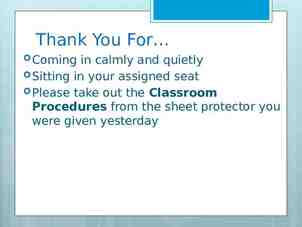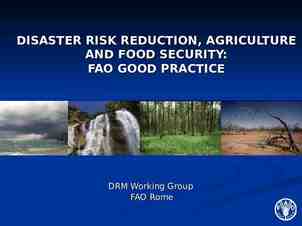Advanced DAPM Lori DeCoste, Michael Redington, & Felicity Shanahan
28 Slides246.35 KB

Advanced DAPM Lori DeCoste, Michael Redington, & Felicity Shanahan US DOT Volpe Center FTA Drug and Alcohol Program National Conference May 11, 2021

Speakers Lori DeCoste – US DOT Volpe Center, Cambridge, MA Michael Redington – US DOT Volpe Center, Cambridge, MA Felicity Shanahan – US DOT Volpe Center, Cambridge, MA 2

Safety-Sensitive - Sometimes Employee ‘could’, ‘might’, ‘may’ perform safetysensitive function: – Operates only when several operators are out sick or on vacation – Operates only once a year – special event – Operates only in an emergency Must employee be in random pool – subject to DOT/FTA testing? Can you “add in” and “pull out” of random pool on a regular basis? 3

Temporary Maintenance Projects Employees performing safety-sensitive functions are covered even during short-term projects. – Must have DOT pre-employment test – Must be in random pool 4

Safety-Sensitive - Supervisors “Supervising safety-sensitive functions” is not a safety-sensitive function. – Must actually perform a safety-sensitive function How do you report on MIS? 5

Post-Accident Decision Making Scenario #1: Operator in hospital, and hospital does not allow testing. – Can you test when released? What if operator went home? Scenario #2: Operator does not report accident with disabling damage and goes home. – Is this a refusal? 6

Post-Accident Decision Making Scenario #3: Police issue a citation and/or provide direction to test the operator. – Do you test? Scenario #4: Collection site is closed due to extreme weather. – Do you test the employee when the site opens the next day? 7

Post-Accident Decision Making – Other Employees Scenario #5: An armed security officer is involved in an accident – Do you test? Scenario #6: A mechanic is injured while maintaining a bus and goes to the ER for medical attention – Do you test? 8

CDL Physicals & Drug Testing DOT physical exams (CMVs) do not require drug tests. – Urinalysis is for metabolic testing (e.g., glucose) Medical Certificate Renewal – Any drug testing must be non-DOT 9

CCFs and Employee ID Numbers Employee’s CDL # in place of SSN/Employee ID is for FMCSA only. FTA should continue to use SSN/Employee ID on CCF. – Error does not require correction – Employers should remind collection sites of their ID preferences (e.g., the use of SSN or Employee ID) 10

Alcohol Testing - When? Pre-employment (optional) – After making a contingent job offer. – Must be DOT test – Must test all safety-sensitive applicants/transferees – Make sure policy matches practice Random – During, just before, and just after performance of safety-sensitive function. Post-accident – As soon as practicable following an accident. 11

Alcohol Testing - When? Reasonable suspicion – During, just before, and just after the performance of safety-sensitive function. – Observations must be made during, just before and just after performance of safety-sensitive function. Return-to-duty – after SAP has determined compliance (and has required RTD alcohol testing). Follow-up – During, just before and just after the performance of safety-sensitive function. – What if not performing a safety-sensitive function? 12

Collection Site – Wait Times What are your responsibilities/options? Example to section 40.61(b)(1) states: – “Collectors and BATs should work together, however, to ensure that post-accident and reasonable suspicion alcohol tests happen as soon as possible (e.g., by moving the employee to the head of the line for alcohol tests).” Post-Accident Testing Documentation Requirements: – 2 hours from accident to alcohol test not 2 hours from accident to arrival at collection site 13

Waiting For Test Results What does FTA require you to do when ? – Employee sent for Reasonable Suspicion drug test – Awaiting Result – Employee sent for Post-Accident Drug – Awaiting Result – Shy Bladder or Shy Lung Evaluation – Awaiting Outcome 14

Pre-Employment Refusals PE drug test begins when donor accepts or selects specimen cup. Donor unable to ‘refuse’ prior to that. Not a refusal – – – – – Donor Donor Donor Donor Donor will not select or accept cup does not go to collection site does not arrive at scheduled time does not provide identification at collection site admits to illegal drug use in interview 2020 MIS* – “Other Refusals” Pre-Employment ‘Other’ PE Drug Refusals 78,032 Drug Tests 402 Random ‘Other’ Random Drug Refusals 152,309 Drug Tests 228 *MIS Data as of 4/12/2021 15

A Cancelled Drug Test A specimen is reported to MRO as “invalid.” A specimen is reported to MRO as “rejected for testing.” A split specimen fails to reconfirm all primary specimen results. Examining physician determines an acceptable medical explanation for employee’s failure to produce a sufficient specimen. 16

Not a Cancelled Drug Test Donor does not show up for a scheduled preemployment test. Donor arrives for a pre-employment test but does not begin the process (by accepting or selecting a cup). Employee cannot go for random test because the collection site is closed due to the COVID-19 public health emergency. 17

Shy Bladder Evaluations Within 5 business days of employee’s failure to provide a sufficient specimen: – Must happen each time employee fails to provide Evaluating physician: – Expertise in medical issues raised by employee’s failure to provide – When possible, should not be employee’s primary care physician MRO is the decision-maker: – Considers evaluating physician’s recommendations and decides Valid medical explanation (cancelled test) No valid medical explanation (refusal to test) 18

Cancelled Tests – Shy Bladder Shy bladder with “temporary” medical explanation. – Not a refusal What does FTA require you to do? – Pre-Employment Test – Random Tests – Follow-Up Tests 19

Second Chance vs. Zero Tolerance Decision does not need to be stated in policy. – Must state DOT consequences (removal from SS duties, referral to SAP) If written policy is zero tolerance, can you bring an employee back? 20

Positives/Refusals - Arbitration Arbitrators may overturn the discipline (termination) following a refusal or positive test result, but not the test result. Remains a DOT positive/refusal result. – Employee must still: Be referred to SAP Successfully complete return-to-duty process Take return-to-duty test(s) with negative result Be subject to follow-up testing – Still report positive/refusal on MIS report. 21

Previous Employer – Positive/Refusal Discover current employee had DOT positive/refusal with a previous employer. – Check if compliant with SAP evaluation, follow-up testing program If not – Pull employee What if discovery is after more than two years? Discover previous employee, with positive DOT result, is performing safety-sensitive elsewhere? – Contact FTA Drug and Alcohol Program Manager (Iyon Rosario) 22

Separate Employer – Positive/Refusal Employee tells you they tested positive at their other DOT employer. – Pull employee from safety-sensitive duties until negative DOT result from other employer. Employee consent required – What if other employer terminated the employee? 23

Follow-up Testing DAPM Did Not Follow the Plan Scenario #1: SAP required both drug and alcohol testing, DAPM only conducted drug testing. Scenario #2: SAP required drug testing only, DAPM conducted both drug and alcohol testing. Scenario #3: SAP required 8 tests in first year, DAPM only conducted 6 tests. 24

Access to D&A Records 655.73(i): “employer may disclose drug and alcohol testing information required to be maintained under this part, pertaining to a covered employee, to the State oversight agency or grantee required to certify to FTA compliance with the drug and alcohol testing procedures of 49 CFR parts 40 and 655.” – Contractors/subrecipients must release D&A records to FTA Grantee upon request Includes subcontractors and independent contractors (taxicab) Do all departments of employer (Risk, HR, Legal, Operations, Accounting, Safety, etc.) have access? 25

FTA Testing and Temp Agencies Who is responsible for: – Drug and alcohol policy? – Required testing? – MIS reporting? Temp agencies should not have access to the employee’s testing records (without the employee’s written consent). 26

Electronic Records & Signatures Records Retention (section 655.71): – Records may be kept electronically Must be completely legible Paper copies may be discarded Electronic Signatures: – Allowed in some instances (e.g., eCCF) – 40.25 consent: must be wet signature 27

Questions? FTA D&A Hotline: [email protected], 617-494-6336 – Lori DeCoste, [email protected], 617-494-2379 – Jennifer Gissel, [email protected], 617-494-3875 – Michael Redington, [email protected], 617-494-2197 – Felicity Shanahan, [email protected], 617-494-3915 Iyon Rosario, Sr. FTA D&A Program Manager: [email protected], 202-366-2010 28






